
Jericho - Iniko - 2023

YouTube Video
Click to view this content.
> > > I'm high, I'm from outer space. I got Milky Way for blood, evolution in my veins > I'm gone, I've been far away > I'ma lumineer now, makin' moves, startin' waves > I've been dreaming about flying for a long time > I had a vision from the grey's, they wanna co-sign > Artificially intelligent, new-AI > I'm your future, past and present, I'm the fine line > Yeah, I'm a missing link of this illusion > I am not really here, I'm an intrusion > I don't swim or sink, I just float > I don't need gravity, I just need growth > When I move, it's an earthquake rumble > I will never, ever fall, never stumble > And I don't need to be humble > Break down walls like Jericho, crumble > I can go higher > Past the stratosphere, I can catch fire > I can go hard, I don't even need to try, yeah > Starblood, I don't ever get tired > Predestined, written in stone > I feel it coming in, I feel it in my bones > Heavily protected, never alone > Tapped in, I'm connected to the unknown > When I move, it's an earthquake rumble > I will never, ever fall, never stumble > And I don't need to be humble > Break down walls like Jericho, crumble > When I move, it's an earthquake rumble > I will never, ever fall, never stumble > And I don't need to be humble > Break down walls like Jericho, crumble > Jericho, Jericho, walls come down > Jericho, Jericho, walls come down > Walls come down like Jericho > Walls come down like Jericho > Jericho, Jericho walls come down > Jericho, Jericho walls come down > Walls come down like Jericho > Walls come down like Jericho > >
dJarabi - Sona Jobarteh and Band
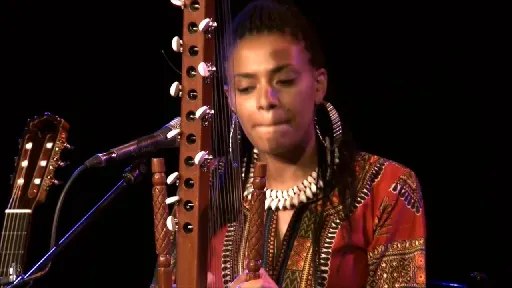
YouTube Video
Click to view this content.
> > > Beloved, forgive me, mothers, but money cannot buy love > It’s true, forgive me, fathers, no riches can buy love > It doesn’t touch you for no reason. > By God, one who owns everything > May still be lonely and worrying about life > While a poor person with nothing > Can find the happiness that love brings > I didn’t know that love felt so good > You left me wondering in sadness > I don’t want gold, I don’t want money > Just to know that I am the one that you love > > > > Love, love is like an alcoholic drink and I am addicted to it > Love, love is a disease for which there is no cure > Love, love is like an alcoholic drink and I am addicted to it > Love, love is a disease for which there is no cure ever > > > > Oh my love, take my hand > Don’t leave me, please stay with me > Can’t you see that I’m worried and suffering? > I’m hurting, hurting, I beg you, please > Talk to me, talk to me and reassure me > Don’t listen to what people say about me > Smile at me, smile at me and take my worries away > You know, I am just in love > > > > You have lit up my life > Now, my heart is full of joy > The world should realise that love > Is more powerful than everything else > And once you taste it > It will change your life forever > > > > Love, love is like an alcoholic drink and I am addicted to it > Love, love is a disease for which there is no cure > Love, love is like an alcoholic drink and I am addicted to it > Love, love is a disease for which there is no cure ever > > > > I’m hurting, hurting because of love, I’m hurting, hurting because of love! (x11) > > > > Here is the poem in the original Malinke. > > > > Jarabi > Aw y’afama nalu, wari tè kanu sanna > Wuya tè aw y’afama n’falu, nafolo tè kanu sanna > A tè se mòosi ma guansan > Walay fen bèe bè dòfè, > Nk’o siini miirijan de la, > Ali fosi tè mòo min fè, > Jarabi di na o dusu sumaya > Ne tun ma lòn ko diyanye duman tan > I k’an to kini kini le la > N’tè sanu kò, n’tè wari dun kò > Ka lòn ten ko ne kelen dòrònle duman i ye. > > > > Jarabi, jarabi ye dòlò le di dunya, ne tè se k’a to yen > Jarabi, jarabi ye bana le di dunya, fura tè bana min na > Jarabi, jarabi ye dòlò le di dunya, ne tè se k’a to yen > Jarabi, jarabi ye bana le di dunya, fura tè bana min na abada. > > > > A n’diya, n’bolo mina sa > Kana taa, to n’dafè sa > I ma n’ye hami ni miiri la wa? > Woyiyo, woyiyo n’b’i dari > Kuma n’fè, kuma n’fè, ka miiri bò n’na > Kana n’mina mòo kan ma > Yèlè n’fè, yèlè n’fè, ka hami bò n’na > I ma lòn i diyanye bana le ye n’na. > > > > I kèlen yeelen di ne ma > Sisan ne kòni sèwara > Fo k’a ye ko diyanye min ye > A fanka ka bon ni fèn bèe ye > N’i y’a nènè dòròn sinya kelen > A b’i la dinya latè yèlèma. > > > > Jarabi, jarabi ye dòlò le di dunya, ne tè se k’a to yen > Jarabi, jarabi ye banna le di dunya, fura tè banna min na > Jarabi, jarabi ye dòlò le di dunya, ne tè se k’a to yen > Jarabi, jarabi ye banna le di dunya, fura tè banna min na abada. > > > > Woyiyo woyiyo jarabi, woyiyo woyiyo jarabi (x11) > >
> > > Sona Jobarteh (born 1983) is a Gambian multi-instrumentalist, singer and composer. She is from one of the five principal kora-playing griot families of West Africa, and is the first female professional kora player to come from a griot family. She is the cousin of the celebrated kora player Toumani Diabate, and is the sister of the diaspora kora player Tunde Jegede. > >
@MHowell asɛnka nni ho! Great read and good points, especially this one:
If you’re a writer or an activist or anyone else engaged in critical synthesis, then the news-stories, ideas, sights and sounds you encounter are liable to tug at your attention: this is a piece of something bigger, and maybe something important.
That tug is the old call of the storyteller - that there is something vital in your words, needed by someone, somewhere, and that alone makes the tale worthwhile to tell.
“No matter how tired you get, no matter how you feel like you can’t possibly do this, somehow you do.”
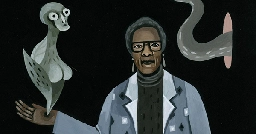
>
>
> No matter how tired you get, no matter how you feel like you can’t possibly do this, somehow you do.
>
>
>
> Once, Octavia Butler (June 22, 1947–February 24, 2006) set out to write a memoir. But she found that “it felt too much like stripping in public,” so she abandoned it. Today, all of her autobiographical reflections, all of her overt politics, all of her creative credos come down to us solely through her interviews, now collected in Octavia E. Butler: The Last Interview and Other Conversations (public library).
>
>
>
> These conversations are also the reliquary of Butler’s hard-honed wisdom on the craft of writing, which she taught herself and mastered against the odds of her time and place to become one of the most abiding and beloved literary voices of the past century — part prophet, part poet of possibility.
>
>
>
> In an interview given just as she was beginning what would become her iconic Parable of the Sower, she offers young writers the pillars of the craft:
>
>
>
> > "The first, of course, is to read. It’s surprising how many people think they want to be writers but they don’t really like to read books… The second is to write, every day, whether you like it or not. Screw inspiration." > >
>
>
>
> More than a decade later, having proven it with her own life, she redoubles her faith in work ethic over inspiration as the central drive of art. An epoch after Tchaikovsky observed that “a self-respecting artist must not fold his hands on the pretext that he is not in the mood” and Camus insisted that “works of art are not born in flashes of inspiration but in a daily fidelity,” Butler exhorts young writers:
>
>
>
> > "Forget about inspiration, because it’s more likely to be a reason not to write, as in, “I can’t write today because I’m not inspired.” I tell them I used to live next to my landlady and I told everybody she inspired me. And the most valuable characteristic any would-be writer can possibly have is persistence. Just keep at it, keep learning your craft and keep trying." > > "Forget about talent, whether or not you have any. Because it doesn’t really matter. I mean, I have a relative who is extremely gifted musically, but chooses not to play music for a living. It is her pleasure, but it is not her living. And it could have been. She’s gifted; she’s been doing it ever since she was a small child and everyone has always been impressed with her. On the other hand, I don’t feel that I have any particular literary talent at all. It was what I wanted to do, and I followed what I wanted to do, as opposed to getting a job doing something that would make more money, but it would make me miserable." > >
>
>
>
> It was not easy for Butler to follow what she wanted to do. She did have to take terrible job after terrible job. She worked at a hospital laundry. She worked as a telemarketer. (“I have a good phone voice,” she says apologetically. “I am told I have a good phone presence, and I actually sold things to people. I’m very ashamed.”) But all along, she was writing and writing. Looking back on the dogged devotion of those early days, that vital time when the foundations of one’s craft and credo are laid down, she reflects:
>
>
>
> > I remember another writer and I corresponding, and he had dropped out. I said, “Why haven’t I seen more from you?” He said, “Well, I didn’t make anything on my first three books.” My comment was, “Who makes anything on their first three books?” I remember that the time I quit that laundry job, it was to go to a Worldcon in Phoenix… I decided I was going to try to live as frugally as possible, and at that time you really could live very frugally. My rent was one-hundred dollars a month. So if you were content not to drive, and if you were content to wear the same clothes that you’d been getting along on for a long time… and there were other ways of not spending lots of money. I didn’t eat potatoes for years after that. I decided that I was going to live off the writing, somehow. > > "No matter how tired you get, no matter how you feel like you can’t possibly do this, somehow you do." > >
>
>
>
> When an interviewer relays the apocryphal story of how Bram Stoker spent years producing mediocre writing without anyone’s notice until one day lightning struck him and out came Dracula, Butler immediately refutes this myth of divine inspiration with its dangerous intimation that excellence is the product of circumstance or chance. Having placed at the heart of her Parable of the Talents the question of creative drive, having framed it as a matter of “a sweet and powerful positive obsession,” she insists once again on the immense creative power of simply showing up for the work:
>
>
>
> > "It’s one of the things that I try to keep young writers from thinking, that you have to wait, that it’s all luck, lightning will strike and then you’ll have a wonderful bestseller. So I think it’s like the old idea that fortune favors the prepared mind. If you’ve developed the habit of paying attention to the things that happen around you and to you, then, yeah, you’ll get hit by lightning." > >
>
>
It's My House - Kabelo - 2002 (South Africa Kwaito)

YouTube Video
Click to view this content.
> > > Thank you very much Kalawa for jazzing me up. This ladies and gentlemen is Mr Bouga Two Shoes, in the place to be, and it go a little something like this: > >
> > > Wangen’ u-Mr Bouga Two Shoes > Wathul' ukuthi, balele > Haha, wahleka > Abantu laba ngapha bathi Bouga Luv lahlela > Bathu ba bantswela kae? > Ka thula kare nna ke tla mamela > Ha, kea lelemela > De kunutu ke a di tobetsa > Kere, focus otla mesa > Ha, Bouga Luv, wamampela > Haha, ke tsela fela > Bampitsa mamapudi > Ke tlo dlala mapantsula till the day that I die > Ke tlo lahlela mekonko get high > Kuzo kahal' iphihli > Ngithi lathesha, ha, ke tla o etsetsa > You might also like > Mbuzi (Freestyle) > AKA > Dear Oliver > Nasty C > Big Difference > Nicki Minaj > [Chorus] > For as long ngisaphefumula > Ngizohlala ng’gudla > He ngishay' ngesdudla > Haha, yesami les'khundla > > > > For as long ngisaphefumula > Ngizohlala ng'gudla > He ngishay' ngesdudla > Haha, yesami les'khundla > > > > Ekse, balele, balele, balele, balele > He ngizo bavusa > He ngizo bavusa > > > > Ekse, balele, balele, balele, balele > He ngizo bavusa > He ngizo bavusa > > > > Look and see > Kalawa's jazzing me > I'm part o’ the best crew in the industry > What you want from me? > First album platinum plus > U kile wabona kae wena ntho e so? > U kile wabona kae wena ntho e tje? > Kere 7 years later, I’m still getting greater > Onshebe hantle [?] elevator > Ke tlo dlala mapantsula till the day that I die > Ke tlo lahlela mekonko [?] get high > Kuzo kahal' iphihli > Ngithi lathesha, ha ke tla o etsetsa > Ke tla o tobetsa > Kuzo kahal’ iphihli > Ngithi lathesha, ha ke tla o etsetsa > Ha, ke tla o tobetsa > > > > For as long ngisaphefumula > Ngizohlala ng'gudla > He ngishay' ngesdudla > Haha, yesami les'khundla > > > > For as long ngisaphefumula > Ngizohlala ng’gudla > He ngishay' ngesdudla > Haha, yesami les'khundla > > > > Ekse, balele, balele, balele, balele > He ngizo bavusa > He ngizo bavusa > > > > Ekse, balele, balele, balele, balele > He ngizo bavusa > He ngizo bavusa > > > > (It's my house) > He ku kwami la, ningadlaleli la > (It's my house) > Ningadlaleli la, umsindo wenu la > (It's my house) > Ku kwami la, ningadlaleli la > (It's my house) > Ningadlaleli la, umsindo wenu la > (It's my house) > > > > Kel' wabona kae wena ntho eso? > Kel' wabona kae wena ntho eje? > Ke 7 years later, I'm still getting greater > Onshebe hantle elevator > Ke tlo dlala mapantsula till the day that I die > Ke tlo lahlela mekonko get high > Kuzo kahal' iphihli > Ngithi lathesha, he Sebetlo lahlela > > > > For as long ngisaphefumula > Ngizohlala ng'gudla > He ngishay' ngesdudla > Haha, yesami les'khundla > > > > For as long ngisaphefumula > Ngizohlala ng'gudla > He ngishay' ngesdudla > Haha, yesami les'khundla > > > > Ekse, balele, balele, balele, balele > He ngizo bavusa > He ngizo bavusa > > > > Ekse, balele, balele, balele, balele > He ngizo bavusa > He ngizo bavusa > > > > (It's my house) > He ku kwami la, ningadlaleli la > (It's my house) > Ku kwami la, ningadlaleli la > (It's my house) > Ningadlaleli la, umsindo wenu la > >
Sphiwe (Given) - The Return - Mshoza - 2005

YouTube Video
Click to view this content.
Mshoza, you dance with the ghosts now, but your request has been heard by Papa Legba, and with his blessing, you've been given your return.
> > > Mshoza Biography > > > > Mshoza was born as Nomasonto Maswanganyi, in Johannesburg on January 7, 1983, and she resided in Protea North with her grandparents. She later had to relocate to Green Village, on the outskirts of Soweto, to live with her mother and step-father in Green after the demise of her grandmother. She had two siblings namely Thandi (29 years) and Seipati (18 years). She had her primary school education at Khuthala Protea North grade. Mshoza completed her basic school education at Rebone Naledi. She furthered her high school academic pursuit at Reasoma Protea North grade and completed at P.Q Mvundla Rockville grade. Mshoza also enrolled in Soweto Tech Marketing (Mono Technical). > > > > Her music career began at Protea when she was ten years. In the mid-1999, she went to Jam Alley, where she freestyled as a contestant over Chiskop’s instrumental (Abasazi). From dancing, she signed as an artist at the age of 15. Mshoza acknowledged that this was how she made her first millions. Conversations on Mshoza’s body comes up since she started bleaching her skin in 2011. She says that she had pregnancy-induced hyperpigmentation, and her husband, Jacob Mnisi told her she was too dark after she gave birth to their second child, which is what pushed her to bleach. She later underwent more cosmetic surgery procedures and said that her goal was to give Nicki Minaj a run for her money. She also loved to price her body at over R500k. > > > > Mshoza Husband > > > > Mshoza was legally married to Jacob Mnisi, a businessman in 2007. Their relationship as a couple resulted in being blessed with two children. After 4 years of marriage, the marriage ended after reports of both being unfaithful was covered. She later got married to Thuthukani Mvula in 2017. The marriage could not stand the test of time. This was because she reported that she had been receiving both emotional and physical abuse from her husband. She also said that Mvula sent her packing from their home in KwaZulu-Natal’s Bergville region. Later on that year in February, it was reported that she married again and the ceremony was private, with close family and friends present to witness her get married to Prince Dlamini, a businessman from East Rand. > > > > Mshoza Death & Cause > > > > Mshoza was admitted at Far East Rand the hospital on Wednesday, November 18, 2020, and died on Thursday morning due to complications from diabetes. The 37-year-old musician first revealed that she was diabetic in 2014 when she was hospitalised after a health scare. > > > > Mshoza Funeral > > > > Mshoza’s friends and mourners including the entire music fraternity at the at House of Treasuries Ministries in Rispark, Johannesburg came to pay their final respects to the kwaito Godmother. Those closest to Mshoza celebrated her life including her childhood friend and actress Khanyi Mbau who said Maswanganyi’s death as a huge loss to the industry and the nation. > >
Black Orpheus (Orfeu Negro) - 1959 - starring Marpessa Dawn and Breno Mello, directed by Marcel Camus
> > > Black Orpheus (Portuguese: Orfeu Negro [ɔɾˈfew ˈneɣɾu]) is a 1959 romantic tragedy film directed by French filmmaker Marcel Camus, and starring Marpessa Dawn and Breno Mello. It is based on the play Orfeu da Conceição by Vinicius de Moraes, which set the Greek legend of Orpheus and Eurydice in a contemporary favela in Rio de Janeiro during Carnaval. The film was an international co-production among companies in Brazil, France and Italy. > > > > The film is particularly noted for its soundtrack by two Brazilian composers: Antônio Carlos Jobim, whose song "A felicidade" opens the film; and Luiz Bonfá, whose "Manhã de Carnaval" and "Samba de Orfeu" have become classics of bossa nova. The songs performed by Orfeu were dubbed by singer Agostinho dos Santos.[6] Lengthy passages of filming took place in the Morro da Babilônia, a favela in the Leme neighbourhood of Rio de Janeiro. > > > > Black Orpheus won the Palme d'Or at the 1959 Cannes Film Festival, the 1960 Academy Award for Best Foreign Language Film, the 1960 Golden Globe Award for Best Foreign Film and was nominated for the 1961 BAFTA Award for Best Film. > >
Important to note, there's some controversy over the film in Brazil:
> > > While the 1959 adaptation has been celebrated internationally, it has been criticized by Brazilians and scholars for exoticizing Brazil for an international audience and reinforcing harmful stereotypes. > >
and...
> > > The Palme d'Or and Oscar-winning film was celebrated internationally and criticized in Brazil; Vinicius de Moraes, author of the play Orfeu da Conceição upon which the film was based, was outraged by the film and left the theater in the middle of the screening. Critics of the adaptation by Marcel Camus argued that it reinforced various stereotypes about Brazilian culture and society and about Afro-Brazilians specifically, portraying the characters as "simple-minded, overtly sexual, and interested only in singing and dancing." Setting out to make itself more "appealing" to foreign audiences, the film resorts to a "cheap and problematic exoticism" of Brazil. > >
This movie is an explosion of cinematic joy de vivre, unique in the energy it brings to a classic tragedy, and a unique picture of Brazil in the late 50s, I've decided to let the audience decide where their opinions sit in the controversy above.
Captions in English available in settings -\> captions on the player for those that don't speak Portuguese.
Wasted Eyes - Fountain Baby - Amaarae - 2023

YouTube Video
Click to view this content.
> > > Racks on racks, money ginja me > Opps, they talk, say na frequency > Had to laugh way they humor me > Runnin' it up with the urgency > Streets dey over ginja me > From the wall to the window seat > In the sun, through the storm, in the winter > I'm in the club, shawty moving like a ninja, ninja > Fresh to death, I'm beyond heat > Activist in my Dior jeans > Buss a jigg, feed you Molly > Feed my love like crack to this fiend > I can't be your lover > Too many things to lose > You love me with no honor > Don't wanna leave, I don't > I knew that you were trouble > Wasted eyes on you > I can't be your lover > Too many things to lose > Demon with the Dior on the dresser > Pop a Molly tessie in a Tesla > Let it warm your back and your neck (uh, uh, uh) > I'ma film it all, make a best-of > Edit it all, make it scene on scene > Under it all, know you scheme on me > Hottie million with a milli' on me > I wanna menage with the blicky on me > Turn the bass up (tell me what you want, want) > She want more to taste, uh (I can get it all, all) > (Pretty little bitch, give me pretty, give me nana) > (Take me to Nirvana, diamond in the sky-y) > I can't be your lover > Too many things to lose > You love me with no honor > Don't wanna leave, I don't > I knew that you were trouble > Wasted eyes on you > I can't be your lover > Too many things to lose > >
The Songhai Empire - Africa's Age of Gold
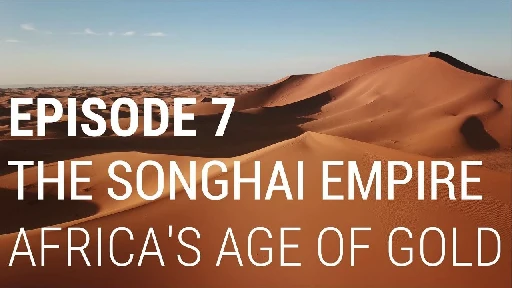
YouTube Video
Click to view this content.
> > > The Songhai Empire (also transliterated as Songhay) was a state located in the western part of the Sahel during the 15th and 16th centuries. At its peak, it was one of the largest African empires in history. The state is known by its historiographical name, derived from its largest ethnic group and ruling elite, the Songhai people. Sonni Ali established Gao as the empire's capital, although a Songhai state had existed in and around Gao since the 11th century. Other important cities in the kingdom were Timbuktu and Djenné, where urban-centred trade flourished; they were conquered in 1468 and 1475, respectively. The Akan state of Bonoman was located to the south of the empire.[3] Initially, the Songhai Empire was ruled by the Sonni dynasty (c. 1464–1493), but it was later replaced by the Askia dynasty (1493–1901). > > > > During the second half of the 13th century, Gao and the surrounding region had grown into an important trading centre and attracted the interest of the expanding Mali Empire. Mali conquered Gao near the end of the 13th century. Gao remained under Malian command until the late 14th century. As the Mali Empire started disintegrating, the Songhai reasserted control of Gao. Songhai rulers subsequently took advantage of the weakened Mali Empire to expand Songhai rule. > > > > Under the rule of Sonni Ali, the Songhai surpassed the Malian Empire in area, wealth, and power, absorbing vast regions of the Mali Empire. His son and successor, Sonni Bāru, was overthrown by Muhammad Ture, one of his father's generals. Ture instituted political and economic reforms throughout the empire. > > > > A series of plots and coups by Askia's successors forced the empire into a period of decline and instability. Askia's relatives attempted to govern the kingdom, but political chaos and several civil wars within the empire ensured the empire's continued decline, particularly during the rule of Askia Ishaq I. The empire experienced a period of stability and a string of military successes during the reign of Askia Daoud. > > > > Askia Ishaq II, the last ruler of the Songhai Empire, ascended to power in a long dynastic struggle following the death of Daoud. In 1590, al-Mansur took advantage of the recent civil conflict in the empire and sent an army under the command of Judar Pasha to conquer the Songhai and gain control of the trans-Saharan trade routes. Following a defeat at the Battle of Tondibi in 1591, the Songhai Empire collapsed. > >
What the Fuck? Omar Sterling - 2022
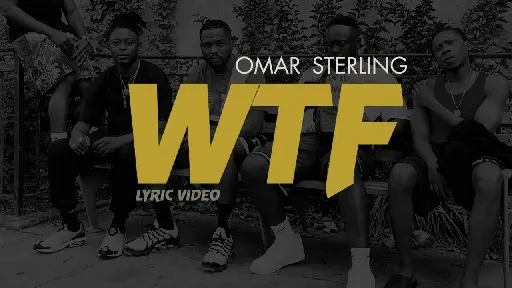
YouTube Video
Click to view this content.
This song is for Fire. I was good friends with Fire. So I'd come over and see Fire and we'd have dinner. I'd bring the meat and Fire would cook. But it was a long ways to Fire's house, so I invited Fire to come to my house for a barbecue.
But Fire told me he can't walk, and so to get to my house, I must lay a path of dry bush, and Fire could walk on top of dry bush to the barbecue.
I was married at the time to Ground Dove. Ground Dove wasn't pleased with the idea. "Don't bring that red-haired bastard over here! He'll get drunk, want to come inside, and then pass out!"
I laughed at her. Fire was my friend, after all. So I laid out a path of dry brush, and fire came skipping and jumping down the path to the barbecue. But when he got close, he jumped on me, then jumped on my house, and burnt everything but Groud Dove.
She left me shortly thereafter. What the fuck, Fire? I thought we were friends.
▸ Spider Dance ▸ Holder Remix ▸ Undertale Remixed
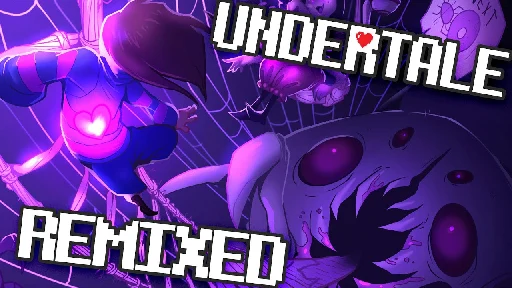
YouTube Video
Click to view this content.
This is the song for my next tale. Once there were no stories in the world. So I decided to go to Nyan-Kopon the sky god in order to buy the sky god’s stories. The sky god said, “What makes you think you can buy them?”
“I know I shall be able.” I said, flashing my roll.
Nyan-Kopon laughed and said, “Great and powerful towns like Kokofu, Bekwai, Asumengya have come and they were unable to purchase them, and yet you who are but a masterless man, you say you will be able?”
“What is the price of the stories?”
The sky god said, “They cannot be bought for anything except Onini the python, Osebo the leopard, Mmoatia the fairy, and Mmoboro the hornet.”
"That's it?"
The sky god sneered, “Go and bring them then!”
So first on the list was the snake. I went to where Python lived and debated out loud whether Python was really longer than the palm branch or not as his wife Aso says. Python overheard and, when I explained the debate, agreed to lie along the palm branch. Because he cannot easily make himself completely straight a true impression of his actual length is difficult to obtain, so Python agreed to be tied to the branch.
When he was completely tied up, I took him to the sky god.
To catch the leopard, I dug a deep hole in the ground. When the leopard fell in the hole I offered to help him out with my webs. Once the leopard was out of the hole he was bound in my webs, making a nice package for Nyan-Kopon.
To catch the hornets, I filled a calabash with water and poured some over a banana leaf that I held over my head and some over the nest, calling out that it was raining. I suggested the hornets get into the empty calabash, and when they obliged, I just sealed the opening.
To catch the fairy I made a doll and covered it with sticky gum. I placed the doll under the Odum (Tree of Life) where the fairies play and put some yam in a bowl in front of it. When the fairy came and ate the yam she thanked the doll which of course did not reply. Annoyed at its bad manners she struck it, first with one hand then the other. The hands stuck and I captured her, although she did try to bite me.
When I handed my captives over to Nyan the sky god. The latter said, “Kawku Anansi, from today and going on forever, I present my sky god stories to you, kose! kose! kose! my blessing, my blessing, my blessing! No more shall we call them the sky god stories, but we shall call them the spider stories!"
This is my story which I have related. If it be sweet, or if it be not sweet, take some elsewhere, and let some come back to me.
Akwaaba - GuiltyBeatz, Mr Eazi, Patapaa & Pappy Kojo - 2018
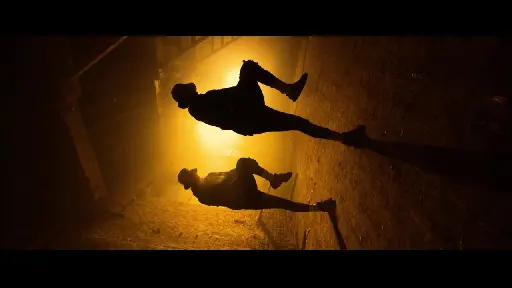
YouTube Video
Click to view this content.
Akwaaba, this is the music I choose for my first tale, the real story about how I became spider...
There was once a African king who bragged he had the finest ram in the world.
Well, when this ugly, fat, angry ram happened to be grazing on my crops one day, I threw a rock at it - just to scare it. But I slipped and hit it between the eyes. Killed the kpɛkpɛ thing.
I knew that the king would punish me for what I'd done to the prize ram, and I knew I had to figure something out.
So I went to sit under a tree to think of an escape when, all of a sudden, a nut fell and struck me on the head. Gave me a great idea.
First, I took the dead ram and tied it to the nut tree. Then I went to this spider and told it of a wonderful tree laden with nuts.
The spider was delighted and immediately went to the tree. Then I went to the king and told him that the spider had evidently killed the prize ram; the ram was hanging from a tree where the spider was spinning webs. The king flew into a rage and demanded the death penalty for the spider.
The king thanked me and offered him a great reward. So I returned to the spider and warned it of the king's wrath, crying out to the whole world that the spider had killed the ram.
The spider was very confused, but he had bitten me more than once in my sleep, so I figured it was fair play.
So I told the spider to go to the king and plead for mercy, and perhaps the spider's life would be spared. Meanwhile, the king had gone home for lunch and told his wife what happened.
The wife just laughed and said, "Have you lost your mind? How on earth could a little spider make a thread strong enough to hold a ram? How in the world could that little spider hoist the ram up there? Don't you know, Anansi obviously killed your ram! By now you should know, he is a trickster!".
So the king gets mad that he'd been tricked, and told his court to fetch me immediately. When the king's men came for him, I assumed that it was to bring me to the palace for my reward for turning in the spider.
After all, no one likes spiders.
So I went along with it all.
So I walk into the palace, feeling good, and I say to the king, "Well, what is my reward for the killer of your ram?"
This kinda made the king mad. So he kicks me. Very, very hard. Like smite from God level hard. Enough to split me into two pieces; and from then on, I was no longer a man, but a spider with long legs.
